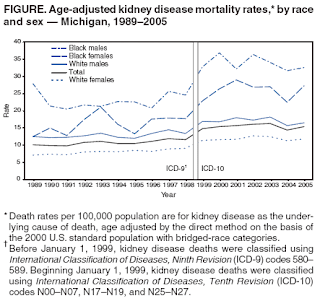Due to sociological factors, black patients face higher rates of death in early stages of the disease
Washington, DC (May 19, 2008) — Black patients have a higher risk of dying in the early stages of chronic kidney disease (CKD) than whites, according to a study appearing in the July 2008 issue of the Journal of the American Society Nephrology (JASN). The findings may explain why blacks have better survival rates once they reach advanced stages of the disease—in essence, because only the healthiest blacks are surviving long enough to develop later stages of the disease. If white patients are given better care in managing their condition early on, even less healthy patients may live to develop advanced disease. But, their compromised health may put them at increased risk of death in the long term compared with blacks.
Puzzled by this paradox, Dr. Rajnish Mehrotra of the Los Angeles Biomedical Research Institute at Harbor-UCLA Medical Center and colleagues set out to find an explanation. They assessed data from a total of 14,611 patients in the Third National Health and Nutrition Examination Survey (NHANESIII), a population-based survey of community-dwelling individuals.
The investigators found that 2,892 of the individuals in the survey had chronic kidney disease, 1,127 of whom died during follow-up. Among those with early-stage disease who were younger than 65 years, blacks had a 78% higher risk of death compared with whites. This elevated risk was significantly related to socioeconomic status and access-to-care. There was also a nonsignificant trend for higher mortality among Hispanics compared with whites.
Dr. Mehrotra and his team conclude that their findings may explain the lower mortality rates observed among black individuals with advanced kidney disease. Blacks may not be receiving as high a quality of care as whites during the early stages of their disease, so that only healthier blacks are surviving and developing later stages of chronic kidney disease.
“These data suggest that factors such as education, poverty, and lower probability of medical insurance may be more important in mediating the high risk for death among younger black individuals than are biologic differences,” the authors write. “This, in turn, may help in prioritizing interventions aimed at reducing the disparities among younger black individuals with chronic kidney disease.” ###
The study entitled, “Racial Differences in Mortality among Those with CKD,” is available online at jasn.asnjournals.org/ and will appear in print in the July issue of JASN.
Dr. Mehrotra is supported by a K23 grant from the National Institutes of Health (NIH). Support for this work was also provided by other grants from NIH.
The American Society of Nephrology (ASN) is a not-for-profit organization of 11,000 physicians and scientists dedicated to the study of nephrology and committed to providing a forum for the promulgation of information regarding the latest research and clinical findings on kidney diseases. ASN publishes the Journal of the American Society of Nephrology (JASN), the Clinical Journal of the American Society of Nephrology (CJASN), and the Nephrology Self-Assessment Program (NephSAP). In January 2009, ASN will launch a newsmagazine.
Contact: Shari Leventhal sleventhal@asn-online.org 202-416-0658 American Society of Nephrology
















No comments:
Post a Comment